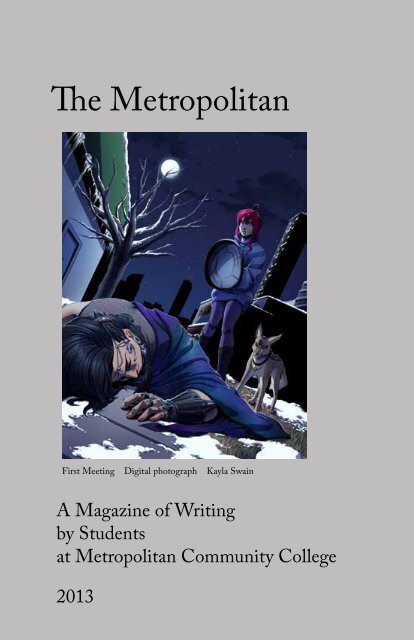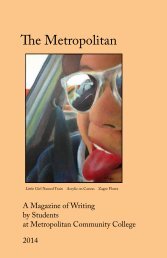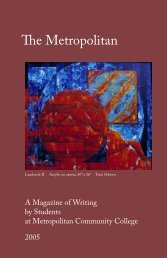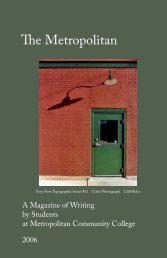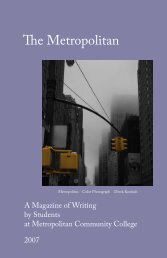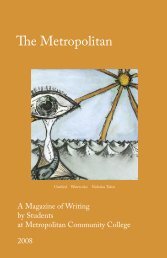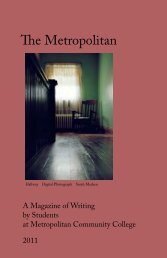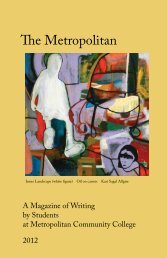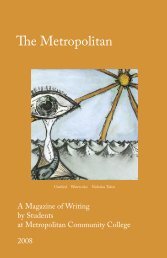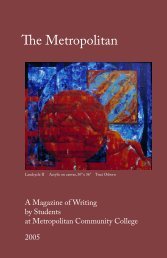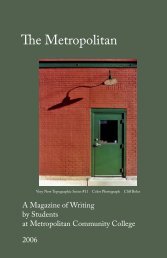2013 Issue
Create successful ePaper yourself
Turn your PDF publications into a flip-book with our unique Google optimized e-Paper software.
The Metropolitan<br />
First Meeting Digital photograph Kayla Swain<br />
A Magazine of Writing<br />
by Students<br />
at Metropolitan Community College<br />
<strong>2013</strong>
The Metropolitan<br />
A Magazine of Writing<br />
by Students<br />
at Metropolitan Community College<br />
<strong>2013</strong><br />
“Anger was washed away in the river along with any<br />
obligation.”<br />
Ernest Hemingway
The Metropolitan <strong>2013</strong><br />
Editors:<br />
Cindy Catherwood<br />
Charlie Cogar<br />
Paul Dickey<br />
Lorraine Duggin<br />
Susan Ely<br />
Dora Gerding<br />
Maria Gutierrez<br />
Chad Jorgensen<br />
Erin Joy<br />
Steve Lovett<br />
Brett Mertins<br />
Michelle Oswald<br />
Katie Stahlnecker<br />
Sara Staroska<br />
Angelika Walker<br />
Technical Advisors: Jamie Bridgham, Jeanne Hansen, Rebecca Orsini<br />
Editorial Assistants: Nicole Cain, Jane Smith<br />
The Metropolitan publishes all types of academic and literary writing, including<br />
descriptive, narrative, expository, and persuasive works, as well as creative<br />
prose and poetry. We encourage writings from across the disciplines and also<br />
welcome visual art. Our goal is to showcase the best of the many voices, styles,<br />
and subjects MCC writers and readers find meaningful and to support critical<br />
thinking, creativity, and expression at Metropolitan Community College.<br />
The Metropolitan is published once a year. The print edition includes<br />
the best selections from the full web edition which can be read at<br />
http://resource.mccneb.edu/metropolitan<br />
Contents<br />
<strong>2013</strong> Writing Awards 4<br />
Malissa Thomas<br />
The Power of Belief 5<br />
Sarah Buettenback<br />
One Summer Day 11<br />
James DeSoe<br />
Reflections from a Rearview Mirror 12<br />
Sue Maresch<br />
Where I’m From 16<br />
Max Douglas<br />
<strong>2013</strong> Cinco de Mayo in Omaha 18<br />
Shirlee Tourek<br />
The Loop 21<br />
Inquiries to metropolitan@mccneb.edu or to<br />
The Metropolitan c/o Cindy Catherwood<br />
South Omaha Campus<br />
Metropolitan Community College<br />
P.O. Box 3777<br />
Omaha, Nebraska 68103-0777<br />
Printed on recycled paper in Omaha, Nebraska by Barnhart Press<br />
©<strong>2013</strong><br />
Nondiscrimination and Equal Opportunity Statement: Metropolitan Community College does not discriminate on the<br />
basis of race, color, national origin, religion, sex, marital status, age, disability or sexual orientation in admission or access<br />
to its programs and activities or in its treatment or hiring of employees.
The Power of Belief<br />
Malissa Thomas<br />
<strong>2013</strong> Writing Awards<br />
For her short story “The Power of Belief,” Malissa Thomas<br />
is the winner of The Metropolitan <strong>2013</strong> Prize for Student<br />
Writing, a 13.5-credit-hour tuition remission. The first runnerup,<br />
Sarah Buettenback, is awarded 9 credit hours tuition<br />
remission for her poem “One Summer Day.” The second runnerup,<br />
James DeSoe, receives 4.5 credit hours tuition remission for<br />
his essay “Reflections from a Rearview Mirror.”<br />
Marta Davis woke up dead on a crisp Friday morning in<br />
September. She wasn’t aware of her passing until she opened<br />
the morning paper. The obituary was so small that, had she not<br />
habitually read every word of the local newspaper daily, she<br />
might have missed it. As it was, she had to read it twice before<br />
she believed it.<br />
Davis, Marta L. (nee Wilson)<br />
Ms. Davis died unexpectedly yesterday evening. She was<br />
predeceased by her husband Stanley, a longtime pillar of the<br />
town community and dedicated doctor of orthopedics. She was<br />
54. Services for Ms. Davis will be held on Saturday at 3pm at<br />
Greater Memorial Cemetery. No reception will follow.<br />
Immediately, she concluded someone had made a terrible<br />
mistake, and even though it cut into her carefully arranged day,<br />
Marta decided that a visit to the paper’s office was in order.<br />
It was only just across town, after all, and a personal visit was<br />
much more impactful than a call or a letter. She had a natural<br />
charisma—grit, her daddy called it—that people found difficult<br />
to ignore.<br />
Dressed in her Sunday best right down to the hat and<br />
gloves, Marta stepped outside, carefully locked her front door,<br />
double-checked the lock, and then headed down her porch<br />
steps. Her tightly rolled, silver curls were arranged tastefully and<br />
neatly under the hat’s wide brim, and her makeup was dabbed on<br />
perfectly. An emergency was no cause to go running out of the<br />
house without first being put together. Her mother always used<br />
to say that steady eyeliner was a sign of a steady mind.<br />
A September cold snap was passing through, and the flower<br />
beds so carefully planted around her porch and along the length<br />
of the walk from her house to the street were withering. Even<br />
so, her little manicured lawn and perfectly planned landscaping<br />
still shone out among the rather lackluster offerings of her<br />
close neighbors. In spite of ample advice she’d given them, the<br />
Howards on her left and the Martins on her right still had<br />
The Metropolitan 5
skimpy flower beds and poorly placed trees, to say nothing of<br />
their diagonally cut lawns. Dreadful.<br />
In a town as small as Evans, the local paper—if one could<br />
even call it that—ran mistakes so frequently Marta marveled<br />
that anyone took the paper seriously at all. She wrote the staff<br />
letters frequently, pointing out their errors and inconsistencies.<br />
They never replied, but the lack of response didn’t deter her.<br />
She considered it her civic duty to provide corrections when<br />
corrections were necessary.<br />
The office of the Evans Gazette was located in the center of<br />
town about five minutes’ walk from Marta’s house. The building<br />
it now occupied was once a barn that had later been converted<br />
into a meeting hall before it found its final calling as a newspaper<br />
office. Marta remembered every iteration except the original.<br />
That was before her time. Somehow, she imagined she could still<br />
smell livestock whenever she approached it. She wrinkled her<br />
nose slightly.<br />
The reception area for the Gazette was no more than a<br />
young woman sitting behind a small desk with a phone and a<br />
few sets of filing cabinets behind her. A couple of mismatched,<br />
wicker chairs were set back against the wall opposite the desk,<br />
and a small table was wedged in between them with a copy of<br />
the day’s paper sitting on it. Any visitors kept waiting longer<br />
than five or ten minutes were going to be terribly uncomfortable,<br />
Marta thought.<br />
She didn’t take a seat; she walked right up to the desk and<br />
waited patiently for the girl to acknowledge her. The receptionist<br />
was a slim brunette in her late twenties. She held the phone to<br />
her ear with one hand while the other hand tapped a pen against<br />
the desktop in an annoying rhythm. After a moment, when it<br />
seemed that she had not been noticed, Marta primly cleared her<br />
throat. The girl on the phone kept right on chatting, apparently<br />
having a lively discussion about weekend plans.<br />
“I’d like to speak to your employer, please,” Marta said<br />
finally, raising her voice just slightly to be heard over the endless<br />
prattle. The girl never even looked her way. “Excuse me,” she tried<br />
again, louder still. The receptionist went right on chattering, and<br />
she swiveled her chair to turn herself away from Marta entirely,<br />
her attention focused on the call and now the contents of her<br />
purse.<br />
The door to the back production area opened, and the<br />
paper’s editor came through the door to the reception desk. At<br />
last! A responsible adult she could talk to. Arthur was a slight<br />
man with a receding hairline and round-lensed glasses that<br />
slipped down his nose at every turn. He had terrible taste in<br />
receptionists and no sense whatsoever of what news was fit to<br />
print, but she had always considered him to be a reasonable sort<br />
in spite of his obvious flaws.<br />
“Arthur, thank goodness! I’ve been standing here asking to<br />
speak to someone for ages,” she told him, frowning pointedly in<br />
the direction of the receptionist who promptly put her phone<br />
conversation on hold the moment she saw the editor appear.<br />
“Lizzie, has Reverend Edwards called back yet?” Arthur<br />
asked the girl, reaching up to push his glasses back with a<br />
fingertip.<br />
“Not yet, boss. Sorry,” the girl told him.<br />
“Arthur,” Marta started again. She stepped closer and<br />
thumped one small, gloved hand down on the reception desk.<br />
The thump rattled the smaller objects on the desk and sent one<br />
of the receptionist’s pens rolling off onto the floor. Neither one<br />
turned their head. “Arthur, did you hear me? I have a very serious<br />
issue I need to discuss with you.”<br />
The conversation between the editor and the young<br />
receptionist never faltered. They went on just as easily as if Marta<br />
weren’t even there. Bewildered, Marta watched Arthur finish<br />
speaking with the receptionist and then retreat back into the<br />
production area. The toe of his shoe bumped the pen on the floor<br />
and sent it skittering across the hardwood as he closed the door<br />
behind him. After she stood there for several minutes, Marta<br />
shook herself, carefully straightened her hat, and turned around<br />
to walk out in a huff. It was obvious that she would find no help<br />
there. Well, she’d just see how the Gazette liked it when she<br />
involved the law.<br />
The sheriff ’s office was minutes from the Gazette building.<br />
Sheriff Charles Daniels had been one of her husband’s oldest<br />
friends. He’d become somewhat less reliable about visits and<br />
6 The Metropolitan The Metropolitan 7
eturning phone calls in the last few years, but there had been a<br />
time when he was over once a week for dinner and a game of gin<br />
rummy with Marta and Stanley. She remembered those evenings<br />
fondly, not just because she missed her dear, departed husband,<br />
but because of how enjoyable it was to have those lengthy chats<br />
with Charles and Stanley about so many interesting topics:<br />
religion, politics, finance. Marta had opinions on them all and<br />
could expound—at length—when given half a chance.<br />
At the sheriff ’s office, Marta marched up and demanded to<br />
speak to the sheriff himself. Not that there were many levels of<br />
command to work through to get to him. The town of Evans was<br />
small enough that the entire complement of currently employed<br />
police officers and staff could comfortably fit in the foyer of<br />
Marta’s house and still have room left over. The sheriff had two<br />
deputies working under him and a young man who answered<br />
phones and filed paperwork for them. In the rare event that they<br />
needed additional manpower for anything, they had to call out to<br />
larger cities for assistance. Fortunately, in the many years Marta<br />
lived in Evans, no such emergency had ever arisen.<br />
It was the young man behind the desk right now. Marta<br />
couldn’t remember his name, either, but she knew him by sight.<br />
The poor boy had such an unfortunate case of acne. She kept<br />
an eye out when reading her women’s magazines for suggested<br />
treatments, and every time she saw him, she offered him the<br />
suggestions. Perhaps it wasn’t Christian of her to be so suspicious,<br />
but she didn’t think he’d tried even one of them.<br />
Marta tucked a stray strand of hair behind her ear and<br />
announced herself. It shocked her to once again be on the<br />
receiving end of silence. His head stayed bent over the files he<br />
was sorting, apparently oblivious to her presence. She knew<br />
perfectly well that that boy didn’t have any sort of hearing<br />
problem. It was he who’d listened to her pour out every detail<br />
of her battle with her previous neighbors to the right before<br />
the Martins moved in. The gnarly, old crab apple tree in their<br />
yard grew so unruly that it completely overshadowed Marta’s<br />
begonias planted along the fence. The ensuing argument over the<br />
tree lasted for nearly a year and only ended when the neighbors<br />
abruptly moved away and Marta quietly had the tree removed<br />
before the Martins moved in.<br />
“Young man,” she said in short, clipped words, “I insist you<br />
stop at once and tell Sheriff Daniels that I’m here to see him.”<br />
It was no use. No matter how she insisted or threatened,<br />
she received no response. Nervous now, and growing increasingly<br />
agitated, Marta left the police station and headed for the<br />
most reliable source of information she knew: the ladies at the<br />
checkout counters of the town’s grocery store. She’d wiled away<br />
many hours over the last few years chatting up the checkout<br />
clerks.<br />
It was after lunchtime, and her shadow fell long across the<br />
sidewalk when she arrived at the grocery store. Wisps of gray<br />
hair peeked out from under her hat, which sat slightly askew on<br />
top of her head. She pushed it back irritably, her gloves wrinkled<br />
and sliding down her palms.<br />
“Linda!” she called to the woman she recognized behind the<br />
counter. “Linda, something bizarre is going on in town today. We<br />
may be under an attack.”<br />
Linda laughed lightly, and that startled Marta long enough<br />
to give her pause to take in the situation. It was as if she hadn’t<br />
spoken at all. As if she wasn’t even there. Linda continued her<br />
mechanical scanning of the grocery items on her counter, the<br />
electronic scanner making rhythmic, cheerful beeps with each<br />
pass. Anne Casey stood with her two small children as she waited<br />
to pay for her purchases. They were chatting about the children’s<br />
school and the chilly weather without a care in the world and<br />
not a single indication that either of them saw or heard anything<br />
strange at all.<br />
Marta was too firm in her Christian faith to believe in alien<br />
mind control, but something was clearly going wrong with her<br />
town. As she nervously tugged her gloves back up into place, her<br />
gaze fell on a stack of the day’s newspapers sitting at the end of<br />
the checkout counter, and her hands froze. It was then that she<br />
remembered her obituary and original reason for coming into<br />
town today. A feeling of dread rolled over her. Could it be true?<br />
Had she somehow died and not noticed? She certainly felt like<br />
some woeful spirit flitting here and there around the town today.<br />
If that was the case, why was she still here? Why hadn’t some<br />
angel come to carry her to her eternal reward?<br />
8 The Metropolitan The Metropolitan 9
Marta’s heart raced, and her eyes were wide as she hurried<br />
out of the store and turned toward home. All these years she’d<br />
spent preparing herself, and she’d somehow managed to miss her<br />
call to Saint Peter. Surely, when she got home, Gabriel would still<br />
be waiting with his horn and his mighty, flaming sword to take<br />
her home. She just had to hurry.<br />
She turned to hasten out and, behind her, had she chanced<br />
to look at the reflection in the storefront glass, she’d have seen<br />
the toddler in the shopping cart seat waving goodbye.<br />
The people of Evans laid Marta Davis to rest on a chilly<br />
Saturday afternoon. The turnout for the funeral was remarkable;<br />
it was the largest number of people that the minister could<br />
remember attending a single service since Marta’s husband<br />
passed. There wasn’t an empty seat left, and some people stood<br />
back around the gravesite holding children on their shoulders to<br />
see over the crowd.<br />
While Stanley was alive, it was easier to ignore the nagging<br />
and the bossing. He was so well loved by the community as a<br />
whole that he just made her seem somehow more tolerable.<br />
The town minister was not informed of the town’s little<br />
ruse, and the sheriff refused to have any part of the trick. He’d<br />
barricaded himself in his office with strict orders not to be<br />
disturbed unless there was some emergency he absolutely had to<br />
attend to. The rest of the town was all too eager to experience one<br />
day without Marta Davis.<br />
The minister finished his sermon, and the groundskeeper<br />
lowered the casket into the grave, while the townspeople milled<br />
around trading furtive, guilty glances. Slowly, they filed out of<br />
the cemetery in low conversation; some were muttering quietly<br />
to themselves. No one thought, when they started, they’d actually<br />
find themselves standing over a casket in the cemetery. At first,<br />
when her neighbor called to report her passing, the sheriff wasn’t<br />
sure what to believe. At her home, he found her sprawled among<br />
her prized begonias, arms outstretched and face tilted up to the<br />
sky as if waiting to be carried away.<br />
One Summer Day<br />
Sarah Buettenback<br />
We impaled those frogs on that barbed wire fence.<br />
We weren’t mean kids as a general rule.<br />
Even years later it doesn’t make sense.<br />
I can still see them squirming. It makes me tense.<br />
Frog juice dripped down to form a pool.<br />
We impaled those frogs on that barbed wire fence.<br />
We’d tortured none before or since,<br />
Not counting the worms dissected in school.<br />
Even years later it doesn’t make sense.<br />
I should have come to their defense.<br />
Would I have seemed too little? Uncool?<br />
We impaled those frogs on that barbed wire fence.<br />
Childhood fun at frogs’ expense.<br />
A lifetime of knowing I’d been so cruel.<br />
Even years later it doesn’t make sense.<br />
Please tell me how to recompense.<br />
We claimed to follow the Golden Rule.<br />
Even years later it doesn’t make sense.<br />
We impaled those frogs on that barbed wire fence.<br />
10 The Metropolitan The Metropolitan 11
Reflections from a Rearview Mirror<br />
James DeSoe<br />
When I was seven years old, I was just beginning to<br />
become my own person with my own distinct personality. At the<br />
age of seven, I was already a seasoned veteran at dressing myself,<br />
brushing my teeth, and tying my shoes. I was also brave enough<br />
to go to the bathroom in the middle of the night by myself if I<br />
needed to. It was around this time that I started forming a set of<br />
values for what I thought was right and wrong.<br />
A major influence on my newfound sense of civility was a<br />
cartoon that came on every Saturday morning called Fat Albert<br />
and the Cosby Kids. The cartoon featured a group of colorful<br />
characters with unique personalities and unusual names. There<br />
was Mush Mouth, Dumb Donald, Bucky, Weird Harold, Rudy,<br />
Russell, Bill, and of course, Fat Albert.<br />
Each episode would start with the show’s creator appearing<br />
on the television screen saying, “This is Bill Cosby coming at you<br />
with music and fun, and if you’re not careful, you might learn<br />
something before it’s done. So let’s get ready, okay? Hey, hey,<br />
hey!”<br />
I was fascinated with this cartoon as a child, mainly because<br />
it was a show about other kids. The music in the show was<br />
pleasing to my young ears, and the jokes were funny to this seven<br />
year old’s sense of humor. For example, the character Rudy would<br />
say something self-centered or foolish, so then the character Bill<br />
would respond by saying, “Rudy, you’re like school on Sundays.<br />
No class.”<br />
Along with the music and humor, each show focused on<br />
life lessons such as the consequences of lying, or why stealing and<br />
vandalism are wrong. There were also episodes about child abuse,<br />
gun violence, and drug use; however, these moral dilemmas<br />
were toned down so that a young person could comprehend the<br />
subject matter. Not only was this cartoon entertaining to my<br />
young heart, it was also educational and character building.<br />
I loved this show so much that when I found out that<br />
the drugstore down the street from my house sold small plastic<br />
figurines of Fat Albert and his gang of misfits, I persistently<br />
pestered my mom until she gave in and purchased the entire<br />
set for me. These small toys were no more than three inches in<br />
height. Each one of these figurines was small enough to fit into<br />
the front pockets of my jeans; therefore, I would always have one<br />
of them on me at all times. I carried them around in my front<br />
pocket like good luck charms. They made me feel safe and secure,<br />
like always having a good friend close by.<br />
While watching each episode of this cartoon, I was<br />
reminded constantly to be a good kid. Whatever situation Fat<br />
Albert and his friends encountered, these African-American kids<br />
from the inner city of North Philadelphia would always do the<br />
right thing. The show continually instilled the virtues of decency<br />
and integrity, and I wanted to be a better person because of this.<br />
One Saturday afternoon in the summer, Mom told my<br />
younger brother and me that we needed to come in from playing<br />
outside and start getting cleaned up. We were going to my uncle’s<br />
house for a barbeque. Uncle Roland was going to grill some<br />
hamburgers and hotdogs, so we needed to hurry up and get ready.<br />
I have always loved the taste of grilled hamburgers, so I was<br />
more than willing to run inside, wash my hands, comb my hair,<br />
and change my clothes. I decided that for this special occasion, I<br />
would take Fat Albert with me.<br />
I was eager with anticipation when we finally arrived at my<br />
uncle’s house. As we got out of the car, I could hear the inviting<br />
sounds of laughter coming from the backyard. I ran to see what<br />
was going on. There, I saw my cousins playing touch football.<br />
Before I even had a chance to join them, Aunt Verleen shouted<br />
out, “Time to eat!”<br />
After filling my little belly with hamburgers, potato chips,<br />
and soda, I was ready to play with my cousins. We horsed around<br />
until it got dark. I was having such a good time that I did not<br />
realize how late it was getting. I could see Dad talking with my<br />
uncle right near the fence at the bottom of the yard. He looked<br />
my way and told me that we were going to be leaving soon.<br />
I started running up to my dad to ask if we could stay a little<br />
longer. As I was running up to him, the toy that I was carrying<br />
12 The Metropolitan The Metropolitan 13
all night started working its way out of my front right pocket. It<br />
eventually dropped onto the grass right in front of my dad and<br />
uncle.<br />
Before I had a chance to pick it up, my dad walked up, bent<br />
down, and retrieved my sentimental treasure. As he held the toy<br />
in his hand, the look on his face expressed a disturbing disgust.<br />
He turned his attention towards me and asked, “Where did you<br />
get this little n***** from? Did your mom buy you this plastic<br />
piece of shit?” He then took the toy and threw it as far and hard<br />
as he could into the dark of night. At that instant, it felt like my<br />
heart had stopped and all of the air had left my lungs. It was as if<br />
my father had just kicked Santa Claus in the face, right in front<br />
of me.<br />
Dad and Uncle Roland had been drinking for a couple<br />
of hours prior to this moment. As I got older, I would come to<br />
realize that intoxication was a daily occurrence for both men,<br />
and this was not the first time my father sucker punched me<br />
emotionally. There were several occasions during my childhood in<br />
which my father was sent home from his job because he was too<br />
drunk to work.<br />
One night in particular, my father came home inebriated<br />
and started acting belligerently towards my mother. I could hear<br />
a lot of screaming and arguing coming from my parents’ bedroom<br />
door. After some time, the door opened and I could see my<br />
mother crying. She had her hand over her left cheek. My father<br />
had smacked her pretty hard this time. As he stumbled towards<br />
our front door, my father turned to me and said, “Jimmy, I want<br />
you to remember one thing. The only good thing about a woman<br />
is what’s between her legs.” He stormed out the door and headed<br />
to the nearest bar to drink some more.<br />
My uncle was not much different from my father. He would<br />
often make disparaging remarks about other ethnic groups.<br />
Along with having drinking and racism in common with my<br />
father, he was also quite the chauvinist. He despised feminism,<br />
even going as far as prohibiting my aunt from watching Murder,<br />
She Wrote. I guess he felt somehow emasculated by Angela<br />
Lansbury.<br />
When Dad threw my toy into the dark abyss that night, my<br />
uncle asserted himself into this distressing situation by saying,<br />
“We don’t associate with j*******s, Jimmy.”<br />
My father’s and uncle’s dysfunctional behavior was starting<br />
to tarnish the hope that was in my young heart. I was beginning<br />
to develop a deep resentment for both of them. I started to cry, so<br />
my father told me to quit acting like a baby and get in the car.<br />
As we headed for home, I was looking at the reflection in<br />
the rearview mirror. Thinking about what just happened, I started<br />
wishing for a different dad. I wanted Bill Cosby to be my father,<br />
not the bastard that was driving us home.<br />
A few years after this incident, my father abandoned our<br />
family, which brought more relief than sadness, to be honest. As<br />
I grew older, my mother faced many struggles to keep a roof over<br />
our heads and food on the table. In spite of this, I feel our family<br />
was better off without my father’s influences.<br />
In many instances, a child does not have much control over<br />
his or her circumstances. Sometimes, good role models come<br />
from different places. At the same time my father was giving<br />
our family grief, Bill Cosby’s cartoon creation was giving me the<br />
moral compass to live my life with love and understanding. It was<br />
as if Mr. Cosby knew that there were kids in this world, just like<br />
me, longing for his positive guidance.<br />
Thinking back on this moment in my life, I was reminded<br />
of something that was told to me long ago. When looking at<br />
a reflection from the rearview mirror of your life, what you see<br />
might not always be pleasant. You must recognize and remember<br />
that the reflection from a rearview mirror shows you where you<br />
have been, not where you are going.<br />
14 The Metropolitan The Metropolitan 15
Where I’m From<br />
Sue Maresch<br />
I am from a town in the north of a kingdom, a town that means<br />
“castle” and dates back to the Roman era. I am from church bells<br />
and minarets, large stone houses with wide open terraces, olive<br />
trees and grape vines and prickly cactus fruit. I am from my<br />
grandfather’s rooftop where I stood looking toward the West,<br />
beyond the horizon, beyond where the sky disappeared.<br />
I am from the rainbow I thought I saw from the airplane window<br />
when we first arrived here, but it was only a trick of light.<br />
I am from a Midwestern city and a house on the corner of a<br />
street, just yards from an elementary school, from a front yard<br />
so steep we had to tie a rope to the lawnmower to mow the top<br />
rows. I am from the garden, from the tomatoes and cucumbers,<br />
the eggplants and peppers that were pickled and stuffed.<br />
I am from the front porch where I played with marbles and the<br />
evergreen bushes where I hid my mother’s kitchen utensils. I am<br />
from silkworms and lightning bugs and headless Barbies and<br />
playing notes on my recorder. I am from Mrs. Pauly’s Restaurant,<br />
seated on the counter, eating french fries while Momma took<br />
orders and cleaned tables. I am from the scab across my nose and<br />
left cheek still visible on school picture day.<br />
I am from skateboards and hopscotch, drawings of stick figures<br />
on the sidewalk with colored chalk. I am from cardamom, clove,<br />
mint and sage. I am from rose water.<br />
I am from the school yard where the boys called me “Big Blue<br />
Marble,” “Suhairy!” and “camel jockey,” and other names my<br />
memory has since forgotten. I am from that little girl who bribed<br />
them with money so they would stop bullying me. I was scared<br />
and timid then, but I grew up to be just as good as they are—<br />
stronger even.<br />
I am from the kitchen table in front of the Brother typewriter<br />
where I typed Baba’s college papers because he asked me to; he<br />
typed slowly, you see. I am from the bags of coffee, sugar and<br />
rice we bring to the families of the dead. I am from small, ornate<br />
coffee cups and the fortunes they tell. I am from the shoes that<br />
do not point their soles to God.<br />
I am from Catholic school plaid skirts, Wednesday Mass, voice<br />
lessons, and play practice. I am from the voluptuous Anita<br />
in Westside Story. I am from Shakespeare and Dickens and<br />
Hawthorne and Poe, read by flashlight in the bedroom closet. I<br />
am from diaries and poems and wishing wells.<br />
I am from the black and white TV where Baba and I watched<br />
Omar Sharif and Sammy Davis, Jr. and Frank Sinatra and the<br />
rest of the Rat Pack. I am from the lamb we slaughtered in<br />
the backyard shed as a sacrifice to God so Baba would recover<br />
from his stroke. I am from joys of laughter as Momma tries to<br />
pronounce “Connecticut” or “strawberry.”<br />
I am from watching planes taking off at Eppley with my<br />
children, sketching with them so many far-away places, lands,<br />
seas.<br />
I am from tears as I see my sisters and daughters grow up to be<br />
women, and my son grows to become a man.<br />
I am from birthday gifts two weeks before Christmas.<br />
I am from the day, tender and pale, the tenuous mist, bathing<br />
everything in a soft radiance. The water is grey, rosy and green,<br />
grey like mother-of-pearl and green like the center of a yellow<br />
rose.<br />
I am from the spring air—clean, fresh,<br />
crisp...<br />
16 The Metropolitan The Metropolitan 17
<strong>2013</strong> Cinco de Mayo in Omaha<br />
Max Douglas<br />
Cinco de Mayo is one of the most significant holidays<br />
celebrated by Mexican Americans. Every year on Cinco de Mayo,<br />
which translated literally means the “fifth of May,” you will find<br />
Omaha Nebraska’s South 24th Street lined with proud Mexican<br />
Americans. As the dark sky lays flat against the background,<br />
there are knees dancing to a loud beat, tortillas being slapped and<br />
baked, carnival games lighting up like flashing stars, and people<br />
parading with smiles. I am a Caucasian American who has grown<br />
up just a few minutes west of South 24th Street, and, almost<br />
every May, I had wondered about the green, white, and red flag<br />
and the shouts of “Viva Mexico!”<br />
During high school, I would squeeze my legs into my best<br />
pair of skinny jeans, loosely wear my best pair of Air Jordans,<br />
and slide my hands through my greasy mop-like curly hair as I<br />
headed to South 24th Street on the Fifth of May. I always stayed<br />
close to my pack of friends like space debris orbiting around the<br />
earth. I kept an eagle’s eye for any potential females, and I kept a<br />
raven’s eye for any bitter-breathed, hot-mouthed drunks. I always<br />
waited for someone to belch, “What’s the gringo doing up here?”<br />
because I already had an automatic response: “Just hanging out.”<br />
However, this year my experience was different—as different as<br />
the first rough lick of a Vero Mango chili sucker.<br />
The population of Hispanics in Omaha is like fire to a wick<br />
of dynamite, and so I was embracing the boom by attempting<br />
to study abroad. After expressing my interest to Metropolitan<br />
Community College’s Study Abroad Counselor, I was cordially<br />
invited to a luncheon where I would meet the instructor. My<br />
initial reaction was, no, I want to learn Spanish and act Spanish,<br />
but I don’t want to actually become Spanish. I sat looking at that<br />
same email with a blank stare until eventually I decided to attend<br />
the luncheon with an open mind in order to please my instructor.<br />
So there I sat with a mind about as open as a window, a plate<br />
of Mexican food (brownish gray beans which felt like mashed<br />
potatoes in my mouth, a burrito drizzled with thick red sauce,<br />
and fluffy orange rice), and a bunch of people I hardly knew. We<br />
mostly talked about Maximon, a Guatemalan idol consisting of<br />
a wooden head, colorful scarves, and a carved mouthful of cigars<br />
and liquor.<br />
While sitting there, I embraced these seemingly fairy tale<br />
stories and ate the Mexican food faster than I thought. Along<br />
with my professor, my classmate Elizabeth, and the entire<br />
audience, we were entertained by a live group of south of the<br />
border dancers. I savored the look of the women who danced<br />
with dresses which would resemble the inside of a candy store.<br />
I marveled at the ten-gallon hats that stood like huge mounds<br />
of brown clay on the foreheads of the guys. Heavy shoes clicked,<br />
clacked, and stomped across the stage as the dancers complied,<br />
no, united in a conversation of dance.<br />
Two days later, I was on South 24th Street at the Cinco<br />
de Mayo celebration with my best friend from grade school. As<br />
we wandered without aim through the crowd, I looked and saw<br />
scarves wrapped tightly around tall faces, faces with mountains<br />
and peaks, and also squeezed tightly to round faces that bubbled<br />
out and dipped to the sides. All of these faces were a different<br />
color from mine, but we all felt the same unpredictable Nebraska<br />
wind blowing our lips chapped. My friend (who happens to be<br />
Hispanic) and I browsed in and out of the alleys as we passed<br />
by bakeries, pottery shops, and all of the carnival games with<br />
the constant background of “Viva Mexico!” We heard it, but we<br />
didn’t know why.<br />
Eventually, I stood before a group of guys with shiny<br />
clothes and cowboy hats rocking out in Spanish. Men and<br />
women danced in front of the live band as they hurled their<br />
knees in the air like a football player chopping his legs through<br />
tires in a football drill. As time passed, I became more and more<br />
aware of the fact that I’m not like them. South Omaha is my<br />
home, but I felt the size-and-a-half too small pair of shoes of a<br />
minority. I have been the minority before, but this night it was<br />
amplified with the music. I thought, but this is good for me. I<br />
need to feel this diversity.<br />
My Cinco de Mayo experience culminated with Omaha<br />
South High winning the state soccer championship. In a sport<br />
where most of the players are Hispanic, I saw why the students<br />
18 The Metropolitan The Metropolitan 19
are proud of their culture. To put it in other words, “Viva<br />
Mexico!” began to make a little more sense to me. After the<br />
championship clock had buzzed, and it showed South 1, Prep<br />
0, one of the players went directly to grab the Mexican flag and<br />
wrapped it around his shoulders. At first I was shocked. Why<br />
would he do that? But then I remembered.<br />
When I had been a student at Omaha South, opposing<br />
teams would dress up with mustaches and sombreros as a way<br />
to mock our players, and during my junior year when our team<br />
lost the championship in a close match, we were mocked with<br />
a shower of green cards. The opposing team’s student section<br />
rushed the field where our defeated team stood and threw the<br />
cards in the air as if they were confetti.<br />
But in that moment, as the South Soccer team paraded the<br />
field, the players made it clear that this championship wasn’t for<br />
themselves, for their coach, for revenge, or even for their school,<br />
but for the community of South Omaha. The team lifted the<br />
Class A Nebraska State Trophy, and it gleamed in the sun and<br />
penetrated into the eyes of the crowd. I saw clearer into the flag,<br />
and marveled how the eagle crushed the snake. “Si se puede!”<br />
The Loop<br />
Shirlee Tourek<br />
Lights up to reveal the mother, an 80-year-old woman who has been<br />
moved to a facility. With all her belongings packed, she waits in the<br />
lobby to be picked up. The daughter, a woman in her fifties, enters the<br />
room and walks over to her mother.<br />
DAUGHTER: Hi, Mom.<br />
MOTHER: Well, look who’s here. I was starting to think you<br />
forgot me.<br />
DAUGHTER: I wouldn’t forget you; I stop by at the same time<br />
every day, just like clockwork. Here, I brought you some cookies.<br />
MOTHER: Ooh, these look good. What kind are they?<br />
DAUGHTER: Oatmeal-raisin, your favorite.<br />
MOTHER: I’m going to have to hide these from your father; he<br />
will eat them all in one sitting if I don’t stash them away. (Pause.)<br />
Well, we’d better get going. If I don’t get supper on the table, your<br />
father will have a fit.<br />
DAUGHTER: Oh, um… I don’t think we need to worry about<br />
that; we’ve got plenty of time. Let’s go for a walk. It’s beautiful<br />
outside.<br />
MOTHER: Oh no, we need to get going. If I don’t get supper on<br />
the table, your dad will have a fit.<br />
DAUGHTER: Let’s just go for a short walk. All the spring<br />
flowers are blooming. I’ll get your sweater.<br />
MOTHER: Oh, I don’t want to go outside. I’ve been working in<br />
the yard all day. Seems like every time I pull a weed, two more<br />
pop up. Dear Lord, I didn’t think I was ever going to get done.<br />
20 The Metropolitan The Metropolitan 21
DAUGHTER: Let’s just go for a short walk. I’ll get your<br />
sweater.<br />
MOTHER: Why do I need a sweater?<br />
DAUGHTER: Well, it’s nice outside, but in the shade it’s a<br />
little cool. So let’s put your sweater on and go for a little walk.<br />
(The daughter looks through her mother’s packed bags to find a<br />
sweater.) Any idea which one of these bags you packed your<br />
sweater in?<br />
MOTHER: Why do I need a sweater?<br />
DAUGHTER: Well, I thought we would go for a walk. All the<br />
spring flowers are blooming. You know how much you love the<br />
spring flowers.<br />
MOTHER: Oh no, we need to get going. If I don’t get supper on<br />
the table, your dad will have a fit.<br />
Daughter takes a deep breath and pulls a puzzle out of a bag she<br />
carried in with her.<br />
DAUGHTER: I brought you a new puzzle. The pieces are bigger<br />
than the last one. Let’s clear off this table and put it together.<br />
MOTHER: Oh, I don’t have time. I need to get home. I have so<br />
much work to do.<br />
DAUGHTER: Let’s just put this puzzle together first.<br />
MOTHER: Let me see the box—I think I’ve done this one<br />
before. (Pause.) Yeah, I’ve done this one already.<br />
DAUGHTER: Well, I’m going to put it together, and you can<br />
help me when I get stuck, okay?<br />
MOTHER: I really can’t. I got to get going. I want to get out of<br />
here before they close this place up. I got stuck here one summer;<br />
the doors were locked, I was all by myself, and I couldn’t get out.<br />
I was scared to death.<br />
DAUGHTER: Don’t worry, Mom. They’re not going to close<br />
this place. They just lock the doors so no one wanders off and<br />
gets lost.<br />
MOTHER: The hell they don’t. I got locked in here after they<br />
closed. Couldn’t find anyone to let me out.<br />
DAUGHTER: Let’s get some ice cream. Let’s go for a walk and<br />
get some ice cream.<br />
MOTHER: Oh, I don’t need any ice cream. I just need to get<br />
home.<br />
DAUGHTER: You feeling okay? You look a little tired.<br />
MOTHER: I am tired. I’ve been working in the yard, pulling<br />
weeds all day.<br />
DAUGHTER: I talked to my friend Julie yesterday. She said<br />
her mom is going to be moving in here, too. Do you remember<br />
Berdene? The two of you were 4-H leaders together.<br />
MOTHER: I can’t think of who you’re talking about.<br />
DAUGHTER: Berdene. She lived in the farmhouse next to ours.<br />
Looks like you’re going to be neighbors with her again. It will be<br />
nice to have someone you know living here.<br />
MOTHER: Why would she live here?<br />
DAUGHTER: Her husband died, and she is having a hard time<br />
remembering things.<br />
22 The Metropolitan The Metropolitan 23
MOTHER: Poor old soul. I’m so glad I’m still able to live on my<br />
own.<br />
DAUGHTER: Mom, you live here. Remember?<br />
MOTHER: Why would I live here? Working here is bad<br />
enough; I don’t need to live here, too. Where are my car keys? I<br />
need to get going.<br />
DAUGHTER: Mom, you don’t have a car. You sold it two years<br />
ago.<br />
MOTHER: Well, how did I get here?<br />
DAUGHTER: I drove you here, two years ago.<br />
MOTHER: I need to get home. I got to get supper on the table.<br />
You know how your dad gets when supper’s not ready.<br />
DAUGHTER: Mom, this IS your home. Dad…Dad passed<br />
away several years ago.<br />
The mother is shocked—in her mind, this is the first time she has heard<br />
about her husband dying. Her lips quiver and her eyes water up with<br />
tears.<br />
MOTHER: Oh my God, how? When? How can this be?<br />
DAUGHTER: He had an aneurysm. It happened very fast.<br />
MOTHER: When?<br />
DAUGHTER: Five years ago.<br />
MOTHER: Why can’t I remember that? Did I go to the funeral?<br />
DAUGHTER: Of course you went to the funeral.<br />
MOTHER: I got to get home. There’s so much to do. I got to<br />
gather the eggs before it gets dark.<br />
DAUGHTER: Jim will gather the eggs. He lives there now.<br />
MOTHER: Who is Jim?<br />
DAUGHTER: Jim’s your son. He bought the farm.<br />
MOTHER: Where do I live?<br />
DAUGHTER: You live here.<br />
MOTHER: Here! Why in the hell would I live here?<br />
DAUGHTER: Well, after Dad died, you lived with me for a<br />
while.<br />
MOTHER: Dad died? When? Why didn’t you tell me? Oh, my<br />
God.<br />
DAUGHTER: I did tell you, Mom. I tell you every day. Well,<br />
almost every day. Sometimes you are so happy, I don’t want to tell<br />
you because you forget, and then when I tell you, it’s like you are<br />
hearing it for the first time.<br />
MOTHER: I always want you to tell me the truth. I get so<br />
confused sometimes because everyone around here lies. All of<br />
them, they are just a bunch of liars. (She cries for a while.) Did<br />
Dad pass away?<br />
DAUGHTER: Yes, he passed away a few years ago.<br />
MOTHER: I know I can’t remember things like I used to, but<br />
you would think I could remember that. This darn old head of<br />
mine. (She knocks on her head with her fist several times.)<br />
24 The Metropolitan The Metropolitan 25
DAUGHTER: Alzheimer’s is a terrible disease, Mom. Do you<br />
remember taking care of Grandma when she had it?<br />
MOTHER: I remember telling you to shoot me if I ever ended<br />
up like that.<br />
DAUGHTER (chuckles): Well, I’m sorry, Mom, but I’m not<br />
going to shoot you.<br />
MOTHER: Am I goofy?<br />
DAUGHTER: No! You are not goofy; you are one of the<br />
smartest people I know. You just can’t remember some things<br />
because you have Alzheimer’s.<br />
MOTHER: How long have I had it?<br />
DAUGHTER: About ten years.<br />
MOTHER: Ten years. (Pause.) Well, I guess I’m not going to live<br />
to be 100, am I?<br />
DAUGHTER: I don’t see why not. You’re as healthy as a horse.<br />
MOTHER: What time is it?<br />
DAUGHTER: Around one.<br />
MOTHER: What are you doing out so late?<br />
DAUGHTER: It’s not late. You just finished eating your lunch<br />
before I got here.<br />
MOTHER: I got to get going. Your dad is waiting for his supper.<br />
You know what a temper your dad has. Remember how he would<br />
sit in the car and honk that damn horn when I was trying to get<br />
you kids ready for church?<br />
DAUGHTER: I remember, and then you would send us out to<br />
the car while you got ready. Dad was so angry about being late<br />
for church, but as soon as you came out of the house he would<br />
always say, “Oh, look, kids, doesn’t Momma look pretty?”<br />
MOTHER (smiling): I never knew that. I never knew he said<br />
that. (She is very pleased to hear that her husband thought she looked<br />
pretty.)<br />
DAUGHTER: I guess you were worth the wait.<br />
MOTHER: Those were the days, weren’t they?<br />
DAUGHTER: Yes, they were. Remember how Dad always<br />
forgot about birthdays and never bought a single Christmas<br />
present. But on Valentine’s Day, he would always come home<br />
with a giant heart for you and five small hearts filled with candy<br />
for us kids.<br />
MOTHER: And a Valentine’s Day card. He always signed it,<br />
from Jim Schurman, as if I didn’t know his last name. What a<br />
knucklehead. Oh, those were the days, weren’t they?<br />
DAUGHTER: Yes, they were.<br />
MOTHER: You know, you are the only one that ever comes to<br />
see me.<br />
DAUGHTER: Oh, that’s not true, Mom. Sheryl was here<br />
yesterday, and Sheila was here the day before that.<br />
MOTHER: How would you know that?<br />
DAUGHTER: I checked the sign-in sheet. When people come<br />
to visit, they have to sign in.<br />
MOTHER: I’m not talking about work; I’m talking about<br />
coming to see me.<br />
26 The Metropolitan The Metropolitan 27
DAUGHTER: I know. You have several visitors every day. I<br />
check every time I sign in.<br />
MOTHER: What time is it? Your Dad is going to wonder<br />
where his supper is.<br />
DAUGHTER: Did I tell you that Mark and Maua are getting<br />
married?<br />
MOTHER: I need to write that down so I don’t forget.<br />
DAUGHTER: I will write it on your calendar before I leave. Just<br />
remind me.<br />
MOTHER: You want me to remind you? That’s not a good idea.<br />
DAUGHTER: Boy, we’re quite a pair, aren’t we? Neither one of<br />
us can remember anything.<br />
MOTHER: What time is it?<br />
DAUGHTER: Time for a joke. What do you get if a baby<br />
swallows a penny?<br />
MOTHER: I don’t know. What?<br />
DAUGHTER: Diaper change.<br />
MOTHER: That’s silly. That’s not even funny. (Pause.) Okay, I<br />
got one: Knock, knock.<br />
DAUGHTER: Who’s there?<br />
MOTHER: Um, gosh I just heard this joke earlier today. It will<br />
come to me. (Pause.) Damn, I can’t remember the punch line.<br />
DAUGHTER (laughing): Or the joke, we never got past ‘knock<br />
knock.’<br />
MOTHER: I can’t remember it either. Boy, we are quite a pair,<br />
aren’t we?<br />
DAUGHTER: Yes, we are. Okay, here’s one. What did the fish<br />
say when he swam into the wall?<br />
MOTHER: What did the fish say?<br />
DAUGHTER: What did the fish say when he swam into the<br />
wall? (Pause.) Dam!<br />
Mother shakes her head like it’s not that funny.<br />
DAUGHTER: Why did the tomato turn red? He saw the salad<br />
dressing.<br />
MOTHER: Don’t quit your day job.<br />
DAUGHTER: Okay, your turn.<br />
MOTHER: Boy, I used to know so many jokes. Can’t think of a<br />
single one.<br />
DAUGHTER: Tell the one about the cow. Do you remember it?<br />
MOTHER: Oh yeah, what do you get from a spoiled cow?<br />
DAUGHTER: I don’t know, what?<br />
MOTHER (laughing so hard she can hardly talk): Spoiled milk.<br />
DAUGHTER: That’s a new one. Did you make that up?<br />
MOTHER: Hell, I don’t know. (Pause.) What’s brown and<br />
sticky?<br />
DAUGHTER: I don’t think I want to know.<br />
28 The Metropolitan The Metropolitan 29
MOTHER: A stick.<br />
DAUGHTER (laughing): Oh my goodness, you better keep your<br />
day job, too. You are the worst joke teller in the whole world.<br />
MOTHER: You mean second worst joke teller.<br />
DAUGHTER: Are you referring to me?<br />
MOTHER: Boy, you are quick.<br />
DAUGHTER: Remember that guy that used to buy eggs from<br />
us? He had a new joke every week. Except his were funny.<br />
MOTHER: I don’t remember his name, but I remember him. He<br />
was so fat he had to wear overalls. Couldn’t find any pants to go<br />
around his big belly.<br />
MOTHER: Oh honey, I got to get back to work here before<br />
they fire me.<br />
DAUGHTER: Okay. (Pause.) Okay, I should get going. I need<br />
to get to work, too. I’ll see you tomorrow, Mom.<br />
MOTHER: Oh wait, I baked you some cookies. Here, take them<br />
home to your family.<br />
DAUGHTER: Oatmeal-raisin, my favorite.<br />
MOTHER: Is that what they are? I can’t remember. I baked so<br />
many today, I didn’t think I was ever going to get done.<br />
DAUGHTER: Bye, Mom. Love you. Thanks for the cookies.<br />
MOTHER: Bye, honey.<br />
DAUGHTER: He must have liked to eat.<br />
MOTHER: His wife was a baker; she made pies and cakes for<br />
all the restaurants. Don’t know how she made a profit with him<br />
eating all her goods. (Pause.) He still buys eggs from me. Shows<br />
up every day, just like clockwork.<br />
DAUGHTER: Hmm….<br />
MOTHER: What time is it? Your dad is going to wonder where<br />
his supper is.<br />
DAUGHTER: Mom, you don’t have to get home. Dad… (Long<br />
pause.) Dad is out of town, remember? He is looking at land to<br />
buy with Uncle Arnold.<br />
MOTHER (pause): That’s right, that’s right. I remember that<br />
now. Hot damn, looks like I got the night off.<br />
DAUGHTER: We should do something fun.<br />
30 The Metropolitan The Metropolitan 31
Contributors’ Notes<br />
Sarah Buettenback writes to save her sanity while juggling life as a wife of one<br />
sports-crazy husband, the mom of two sports-crazy boys and the assistant to<br />
three plain-old-crazy pastors at Citylight Church. In her spare time, she runs<br />
a non-profit basketball league, SCORE 4 Sports, that aims to teach leadership<br />
and positive character to over 300 kids in the metro area. She hopes these kids<br />
will be kind enough to choose not to impale any frogs on a barbed wire fence.<br />
James DeSoe is currently a student at MCC where he is earning an associate<br />
degree in HVAC. English Composition I was one of his favorite classes. He<br />
feels very fortunate for all of the opportunities MCC has given to him. As he<br />
continues his education, he has a lot of appreciation for the instructors at the<br />
school and their commitment to the students. He thanks everyone involved in<br />
allowing him to share his story.<br />
Max Douglas is a South Omaha Boy (SOB). He currently attends the<br />
University of Nebraska at Omaha as an undergraduate in English. Max is a<br />
changing human being, so for now he enjoys learning new languages, rock<br />
climbing, reading, and writing. He is loved by an eternal God and knows<br />
everyone else is as well. Max enjoys trying (and sometimes failing) different<br />
styles of creative non-fiction, which is exhibited in the piece, “<strong>2013</strong> Cinco de<br />
Mayo in Omaha.”<br />
Sue Maresch was born in the northern Kingdom of Jordan and immigrated to<br />
America as a child. She was educated in Catholic schools and enjoyed English,<br />
journalism, theatre, and debate classes the most. During her free time, she wrote<br />
poems and short stories and read countless books. She remains an avid reader<br />
and writer to this day. After raising a family, Sue returned to MCC to earn her<br />
associate degree in liberal arts, which will transfer to the University of Illinois.<br />
When she completes her BA in English there, Sue hopes to earn her master’s in<br />
creative writing. Sue has written a manuscript of her life in America, which she<br />
wishes to publish. She enjoys art, music, travel, documentaries, fine dining, and<br />
spending time with her family.<br />
Kayla Swain is a professional illustrator with a passion for making graphic<br />
novels. She’s been drawing since she was a tot, and art is an intrinsic part of her<br />
life. She works for SkyVu Entertainment and has had artwork on the t-shirts<br />
and programs of Anime NebrasKon. She graduated from MCC in <strong>2013</strong> with<br />
an associate degree in electronic imaging and media arts. Kayla is creating her<br />
own manga, “Midwinter,” an urban fantasy story.<br />
Malissa Thomas was born and raised in Gainesville, Florida, then moved to<br />
Omaha in 2008. A recent graduate of MCC, she now works as a title analyst<br />
and spends her free time training to run a 5k marathon, baking, exploring local<br />
wineries, and writing. Existing in a constant state of self-reinvention, she hopes<br />
to someday find the self that fits best.<br />
32 The Metropolitan
In this <strong>Issue</strong><br />
Sarah Buettenback<br />
James DeSoe<br />
Max Douglas<br />
Sue Maresch<br />
Malissa Thomas<br />
Shirlee Tourek<br />
Right Before Pastel Kyle Carruthers<br />
Read The Metropolitan <strong>2013</strong> full edition at<br />
resource.mccneb.edu/metropolitan


